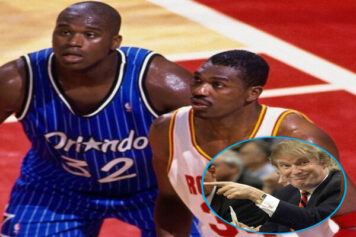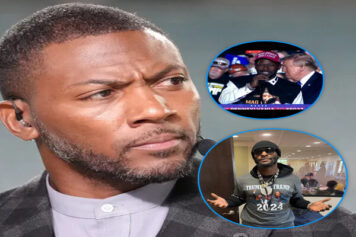“For us, by us” is a phrase that goes beyond what clothing brand FUBU actually meant.
It did, and still does, capture hip-hop’s uniquely defiant ethos with a subtle yet consistent reminder that hip-hop is a community united, inherently, against an unforeseen they.
The phrase was coined by LL Cool J, a hip-hop pioneer who can still remember a time in the 80s when rappers combined their individual influence to spread the word of stopping the violence and avoiding “Self-Destruction.”
That visual sign of social activism by the game’s biggest names became less common as the decades went on. But in 2019, hip-hop is at its most influential as an art form in the world.
In recent history, Jay-Z has become a change agent, helping people like 21 Savage get freedom from Immigration and Customs Enforcement detention; all while becoming hip-hop’s first billionaire.
The man who “took his dollars to give gifts to the projects” has become hip-hop’s resident godfather. And over the past few years, we have seen a wave of some of the most visible social advocacy by popular hip hop artists in decades.
After being released from prison for the second time since becoming a platinum-selling rapper, Meek Mill has used his time as a free man to campaign for criminal justice reform, starting the REFORM Alliance and having his struggle through the legal system showcased on Amazon in his Free Meek docuseries.
21 Savage started the Leading By Example Foundation to help underprivileged kids with financial literacy, even going as far as helping dozens of them start bank accounts with $1,000 of his own money.
Even 2019’s Hip-Hop rookie of the year, Megan Thee Stallion leveraged her growing “real hot girl shit” brand for a “Hottie Beach Clean Up” where fans gathered at the Santa Monica Pier to pick up trash on the beach.
Cardi B used her platform of more than 48 million followers to get questions people wanted to ask Democratic candidate Bernie Sanders after she’s been very vocal about her support for the U.S. senator.
Two days after Cardi posted a photo on Instagram of her and Sanders with a caption about the meeting, she had to cancel a show in Indiana less than an hour before due to death threats.
There has been no link between the death threats and Cardi’s public support of Sanders but, she doesn’t show signs of silencing her political activism any time soon.
It’s beginning to feel as if activism is becoming the status quo. Nowadays, where the average person can be scroll by images of police brutality and racism in between photos of their favorite rapper showing their latest multi-million dollar car purchase on social media, being a rapper comes with the expectation of not only being aware of what’s going on but being active.
“I think nowadays, to be more socially aware is to be more viable, period,” Yesha Callahan, Editorial Director for News & Politics at Essence, told Shadow League. “You want an artist who has their ear to the street and stands for something. You don’t want an artist who’s daft or doesn’t know what’s going on in the world.”
This recent outburst of outward activism amongst hip-hop’s most commercially popular artists coincides with hip-hop becoming the most consumed genre of music in the world. Meek didn’t come home with Jay-Z as his only billionaire supporter.
He’s probably been seen more with New England Patriots owner Robert Kraft and Philadelphia Sixers co-owner Michael Rubin, who helped fund his REFORM Alliance, than almost any rapper.
Hard to imagine their alliance with Meek or the overwhelming support his cause has received, isn’t partly due to hip-hop’s ubiquity in almost all forms of entertainment, sports, politics, and culture.
“I really do feel people are forced to listen, perhaps, hip-hop is beating out the other genres when it comes to streaming and stuff,” Wanna Thompson, music/culture writer, told The Shadow League. “If it’s the most consumed genre it’s kind of hard to avoid people speaking on these injustices.”
Fans have also begun gravitating towards socially conscious messages in their music. Logic’s song “1-800-273-8255,” about suicide prevention and named after the suicide hotline, went five-times platinum in less than a year and a half.
The socially conscious albums DAMN and KOD by Kendrick Lamar and J. Cole, respectively, have been a few of the most successful albums over the last few years, selling millions of copies.
Lamar’s 2017 opus was so accepted by the masses that it sold more copies in 2018 than new projects by Justin Timberlake, Jason Aldean, and Khalid.
“When you have people like Kendrick and J. Cole, these kinds of ‘conscious rappers’ who talk some real shit and they’re charting, labels are like, ‘Oh shit, they’re talking about real stuff and people are still going to listen, support and buy it,’” Thompson proclaimed.
This is all cause for celebration but, celebrations shouldn’t preclude criticism.
Hip-hop’s social activism is a hopeful sign for the future but not an absolution of its past. There’s always been this chasm between rappers and their fan bases when that rapper gains a certain level of celebrity and wealth.
There’s a literal disconnect from the fact they more than likely have moved from the impoverished and precarious conditions a lot of their fans live in. Then, there’s a disconnect that often finds rappers silent on controversial issues.
“When you’re first starting out, I feel, some artists don’t want to be too vocal because they don’t want to lose money or they don’t want to alienate a fanbase. But, now that these artists have made it and are some of the richest people in the world, they probably feel free to say whatever they want to say and support causes they previously couldn’t have supported,” Callahan opined.
In terms of the first decade of the 2000s, outside of Diddy telling people to “vote or die” in the 2004 presidential election or the outpouring of support for Barack Obama in the 2008 election, hip-hop largely left its activism in songs. Then, there’s also the matter of hip-hop’s affinity with glamorizing some of the worst people in the world.
Donald Trump put out a scathing ad in the New York Daily News eviscerating the name of the five Black men falsely accused of raping Trisha Meili in the Central Park in 1989. Trump publicly asked for the execution of five young Black men in one of the most popular newspapers in New York City. Hip-Hop’s response? Nearly two decades of using Trump’s name as a signifier of wealth.
Jay-Z was “at the Trump International, ask for me.” Eminem involved Trump in his 2004 promotion of his album Encore. Jeezy put out a song called “Trump,” gloating that he’s “the richest nigga in my hood, call me Donald Trump,” months after Trump questioned if President Obama was actually an American citizen.
Diddy called Trump “a friend of mine” and left open the possibility he might vote for him for President of the United States…a month before the election and months after Trump had spewed racist rhetoric towards Black people and Mexicans.
“They saw him put out this ad. They saw the things he did. Yet, you still had artists who didn’t mind being seen schmoozing with Donald Trump. They claimed him as a friend, even though years before he was basically a part of a lynch mob,” Callahan asserted firmly.
No one should ever be under the impression that hip-hop is infallible. Its activism is complicated. But, the fact remains, hip-hop is the biggest music genre in the world with an influence that spans the street corners to the White House and, as of recent, has been using that influence for change.
“Hip-hop resonates with all people. It’s a movement and goes beyond what you hear on the radio or see on music videos. You have artists out there who grew up in the hood and saw things that people are still going through every day. When they speak, the masses listen to them,” Callahan concluded.



